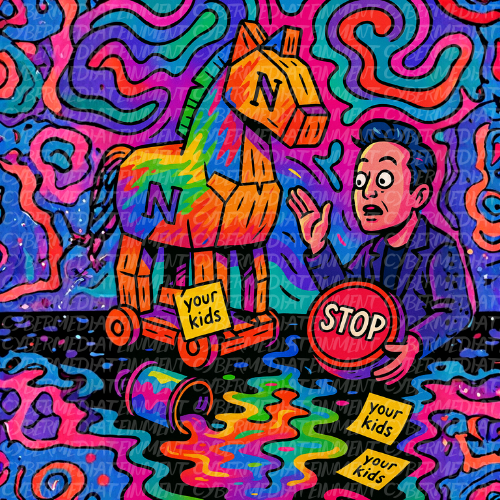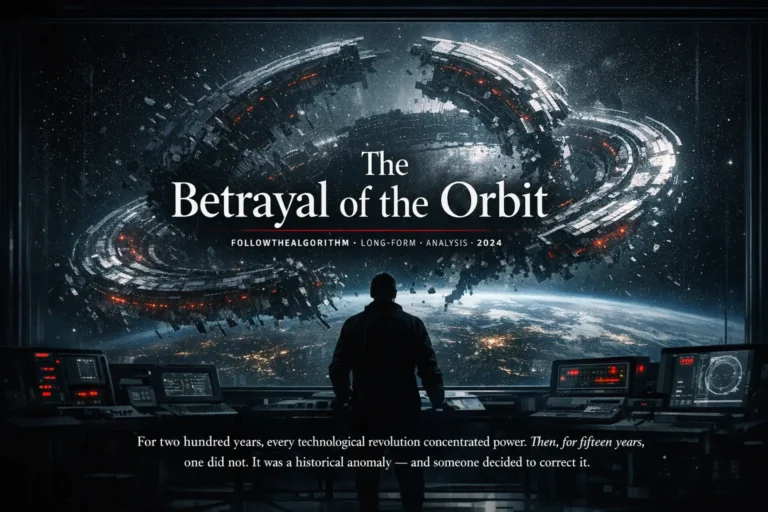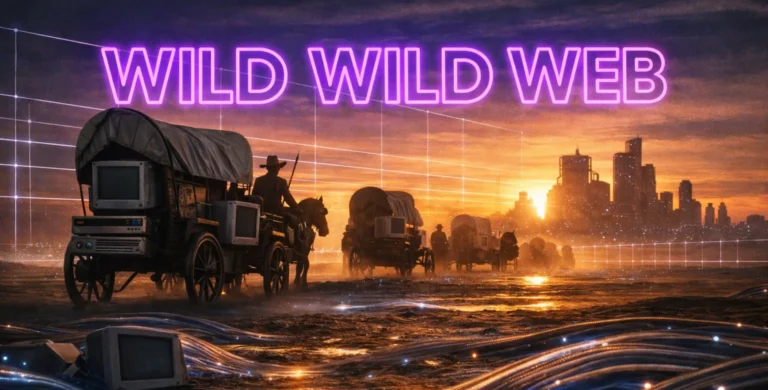The Benevolent Tyrant and digital Democracy Disarmed
How Elon Musk Exposed the Institutional Void of Digital democracy
October 2025. In seventy-two hours, twenty-six posts from Elon Musk against an animated series produce twenty-five billion dollars in Netflix volatility, thousands of death threats to a creator, zero consequences for whoever pulled the trigger. The message is direct: “Cancel Netflix for the health of your kids.” Netflix stock loses five percent before stabilizing. Hamish Steele, creator of Dead End: Paranormal Park, receives systematic doxxing.
The predictable reaction? “Musk has too much power.” “Private platforms are dangerous.” “We need regulation.”
But this narrative completely misses the point. The problem isn’t that Musk has power – it’s that we can finally see the power. Before him, that power already existed, amplified, pervasive, but hidden behind anonymous committees, opaque algorithms, policies presented as neutral. Musk didn’t create platform power concentration: he made it visible.
This is the era of techno-oligarchic power where wealth, infrastructure, and charisma converge. Manuel Castells called it “network society” – the structure where whoever controls critical network nodes controls the flow of power itself. The real question isn’t “How do we stop Musk?” It’s: “Why are we only now noticing this power exists?”
The answer is uncomfortable: because when it was exercised by invisible bureaucracies aligned with progressive orthodoxies, nobody called it power. They called it “content moderation,” “community standards,” “fighting disinformation.”
I. Algorithmic Cultural Monopoly: Netflix as Symptom
Dead End: Paranormal Park is a symptom of systemic transformation. Netflix and streaming platforms have created a cultural monopoly operating according to algorithmic logic identical to social media: maximize permanence, polarize for engagement, conform for retention.
In 2024, four platforms (Netflix 23%, Amazon Prime 21%, Disney+ 12%, Hulu 10%) control over 65% of American audiovisual consumption. But the monopoly isn’t just quantitative: it’s qualitative and ideological.
A Media Research Center study (2023) of 150 new series: 84% include LGBTQ+ characters in relevant roles (vs. 7.2% of population according to Gallup), 67% present central progressive themes, less than 3% present conservatives positively. The comparison with actual population distribution is stark.
The Algorithm of Performance
Netflix revolutionized the industry with data-driven production. University of California Berkeley (2022) discovered that the algorithm optimizes for three metrics: completion rate, binge coefficient, retention impact. This creates a perverse incentive: content that maximizes these metrics isn’t necessarily the best artistically, but that which creates psychological addiction.
Tristan Harris documented in The Social Dilemma (2020) how social media uses identical mechanisms. Streaming platforms do the same but with narrative instead of posts. A Cornell University paper (2023) analyzing Netflix patents finds techniques identical to Facebook:
- Predictive autoplay: minimizes reflection (APA 2022: reduces prefrontal cortex activation by 34%)
- Recommendation bubbles: MIT Media Lab (2023) – after one month, 80% content from only 3-4 micro-categories
- Social proof manipulation: “trending” partially manipulated according to “strategic value”
- A/B testing of editing: Wired (2022) – different versions of same episodes to maximize binge-watching
Psychological Effects
University of Pennsylvania (2024), adolescents 20+ hours/week streaming: +28% identity confusion, -41% family value alignment, +35% moral certainty, -52% perspective-taking ability. More certain of their opinions, less capable of understanding others’ – identical to social media.
Eli Pariser coined “filter bubble” (2011) to describe separated information universes. Streaming platforms have created “narrative bubbles.” A Rand Corporation study (2023) of 10,000 American families shows two completely separate narrative universes between families with progressive vs. conservative viewing habits.

Disney+ is an extreme case: Karey Burke (2021) declared a target of “50% of characters LGBTQIA+ or minorities by 2022.” Result: systemic tokenism, box office disasters (Strange World -$197M), but success on platform because pre-selected audience.
Netflix, Disney+, Amazon aren’t just entertainment: they’re engines of value socialization with algorithmic personalization, autoplay that maximizes immersion, data for optimization, complete production control. More effective than government propaganda – and private property not subject to scrutiny.
II. Digital democracy The Revelation of Hidden Power: Foucault, Colombo and the Progressive Panopticon
José van Dijck et al. in The Platform Society (2018) theorize that platforms aren’t neutral intermediaries but infrastructures that produce society. A fundamental truth that the establishment denied for twenty years. Pre-Musk Twitter, Facebook, YouTube – all feigned neutrality while applying “objective standards.”
Musk destroyed this fiction by openly declaring: “Yes, platforms have power. Yes, I have opinions. Yes, my opinions influence how I manage the platform.” It’s brutal honesty that exposes hypocrisy. With pre-Musk Twitter’s Trust and Safety committees, with Facebook algorithms nobody scrutinized, the power was greater but invisible.
Into the Panopticon: Digital democracy in Foucault
Michel Foucault in Discipline and Punish (1975) describes the passage from sovereign power (visible, spectacular) to disciplinary power (invisible, normalizing). Bentham’s Panopticon: a prison where the central tower observes without being seen. Inmates, believing they can be observed, self-regulate. Power is internalized.
Pre-Musk Twitter was the perfect Panopticon. Shadowbanning – limitation without notification – produced self-censorship. The conservative user moderates themselves. The Twitter Files systematically documented: blacklisting, search bans, shadowbanning, strategic amplification of progressives.
Musk eliminated shadowbanning or made it explicit: “If we limit someone, it will be visible and there will be a reason.” It’s a return to Foucault’s sovereign power: visible, attributable, contestable. Less sophisticated but infinitely more democratic.
Digital democracy or The Regime of Truth
Foucault on governmentality analyzes how modern power operates through production of truth – not repression but controlled proliferation. Power says “talk about this in these terms.”
Twitter didn’t ban COVID: it channeled it into specific frames. “Vaccines safe and effective” OK. “Side effects underestimated” → banned. Foucault calls this regime of truth: procedures that establish what counts as true, who has authority to say it.
Musk destroyed the regime by declaring that there’s no objective truth administrable by a platform: “Post what you want within legal limits, users will decide what’s true.” It’s libertarian epistemology that terrifies the establishment because it eliminates gatekeepers.
Foucault distinguished sovereign power (prohibits), disciplinary (normalizes), biopower (optimizes populations). Pre-Musk Twitter was biopower: they managed the population to “maximize discourse health.” Who decided “health”? Unelected committees with uniform bias.
Musk replaced biopower with sovereign power: simple, transparent rules, with him identifiable and criticizable. Regression in sophistication but enormous progress in democracy.
Digital democracy and the Hypocrisy of “Sociable” Power
Fausto Colombo in Il potere socievole (2013) documents transformation: power no longer as distant authority but as friendship, conversation, spontaneity. But this apparent horizontality hides deep asymmetries.
Colombo identifies three key mechanisms:
1. Asymmetry of amplification: When a normal user posts, it reaches dozens; Musk reaches 200 million. Identical form (280 characters), incomparable effect. But pre-Musk this asymmetry was programmed: Twitter amplified progressives with invisible boosts, throttled conservatives. Musk made asymmetry visible: based on real, verifiable followers.
2. Emotional mobilization: “Cancel Netflix for the health of your kids” – binary emotional frame. But pre-Musk this was a progressive monopoly: #MeToo, BLM received coordinated amplification; conservative hashtags suppressed. Musk leveled the field. Suddenly it’s “dangerous” – but only because now conservatives can do it too.
3. Affective communities: Musk activates tribes based on emotional identification. But pre-Musk Twitter allowed this only for progressive tribes. Conservative communities were systematically dismembered. Musk allowed all tribes to exist.
The most insidious power is invisible (Foucault). Musk made it visible – and visible power is contestable. That’s why the establishment hates him: he made it impossible to pretend power doesn’t exist.
“Woke mind virus” appears in Musk’s tweets from 2020. Critics: “political rhetoric to mobilize base.” But that’s projection. Reality: Musk uses this terminology because it literally describes what he’s observed. “Mental virus” isn’t metaphor: it’s explanatory model.
In 2023-2024 he intensified attacks on DEI: “DEI must die.” It’s not political strategy. It’s an engineer-physicist seeing a system violating principles of rationality. Hiring based on immutable characteristics instead of competence is discrimination masked as “equity.” And he was right: in 2023 the Supreme Court ruled in favor of similar positions on affirmative action.
But on LGBTQ+ content for minors it becomes personal. He has a transgender daughter – Vivian Jenna Wilson – who cut ties. Interview with Jordan Peterson (2024): “I lost my son to the woke mind virus. They call it ‘deadnaming’ for a reason – the child you knew is dead.”
Critics: “emotional manipulation.” But it’s exactly the opposite: it’s radical honesty. He’s saying: “This isn’t abstract debate. I lost my child. Other parents should know.”
Eva Illouz and Edgar Cabanas (Happycracy, 2018) theorize “tyranny of emotion” where feelings have authority superior to facts. But this perfectly describes the other side: “If you feel you’re a woman, you are a woman, and anyone who questions commits violence.” It’s pure emotional epistemology.
Musk does the opposite: starts from emotional experience but frames it in rational terms – adolescent brains not fully developed, irreversible decisions require informed consent that minors don’t have, social pressure creates perverse incentives. It’s analysis that arrives at proposals based on objective principles.
Siva Vaidhyanathan (Antisocial Media, 2018): platforms build opinion through selective amplification. Before Musk, that amplification built progressive consensus. Any critical voice – concerned parents, detransitioners, skeptical therapists, was silenced.
Musk broke the narrative monopoly. He’s not “building” opinion: he’s allowing already-existing opinions to be expressed.
IV. Digital democracy or the Referendum market
The mechanism from post to price reveals the fragility of imposed consensus. He didn’t call hedge funds, didn’t coordinate short sellers. He expressed an opinion and the market reacted.
Why? Because millions of investors agree that Netflix alienates a significant portion of the audience with ideologically loaded content. But no Wall Street analyst dared say it: you’d be labeled a bigot, excluded from professional circles.
Musk said out loud what many thought privately. The market – a mechanism for aggregating distributed opinions – reacted. It’s not manipulation: it’s revelation of sentiment suppressed by political correctness.
Tuesday September 30: first post. Wednesday October 1: Netflix -2.3%, volumes +35%. Thursday: low at $1,160. Drawdown: -5.2%, $25 billion evaporated. Then recovery when Musk moves on.
Zuckerberg: When Meta eliminates fact-checking (January 2025), it’s not an impulsive tweet – it’s a decision prepared for months, communicated strategically to minimize stock price impact. It’s sophisticated manipulation: enormous power with minimal ripple because orchestrated by professionals.
Altman: When OpenAI testifies to Congress requesting regulation, it seems civic responsibility. But he proposes regulation OpenAI can afford, startups can’t. It’s regulatory moat building. Wall Street prices it positively: consolidation under consumer protection mask.
Musk is an outsider using the platform as megaphone. Everyone knows he has 200 million followers. Everyone can discount this in price. There’s no insider trading, advance positioning, coordination. The problem: finally someone outside the club can move markets. And this terrifies the establishment.
V. Three Archetypes of Tech Power in digital democracy
To understand how peculiar Musk is, let’s compare three ways of exercising platform power.
Zuckerberg: The Architect of Invisible Power
Maintains control through dual-class shares. Builds patient relationships with governments. Operates through subsidiaries (Facebook, Instagram, WhatsApp) creating illusion of diversity. Rarely posts. Never spontaneous.
Benjamin Bratton (The Stack, 2015): “platform sovereignty” – platforms as parallel States. Zuckerberg practices it deliberately: he’s built state within state. All impenetrable. More power than Musk but invisible, therefore uncontested.
Altman: The Narrator Who Controls Without Owning
Doesn’t own platform. Exercises power through narrative control. Every frame on AI orients billions: “AGI inevitable” → invest now. “Existential risk” → requires concentration in few players (us). Langdon Winner (Do Artifacts Have Politics?, 1980): technologies embody politics. Altman uses it: every statement is performative prescription.
Musk: The Prince Who Shows Too Much
Does opposite. Doesn’t build think tanks, doesn’t finance lobbying. All power in tweet. At 3am. Without PR. It’s paradoxically more democratic: you can criticize him, he responds, can admit errors. But it’s unpredictable.
The pattern: more strategic awareness, more effectiveness, less transparency. Zuckerberg builds decennial, invisible power. Altman controls narrative without contestable platform. Musk says what he thinks, power emerges as side effect.
His power is the most ephemeral. But it’s the most destabilizing because he made it impossible to pretend platform power doesn’t exist. If even the least sophisticated produces unmanageable effects, what does it mean for the system? That Zuckerberg and Altman – more sophisticated, more opaque – are probably more dangerous.
VI. Institutional Void as Opportunity
The novelty isn’t that the rich influence politics. It’s that Musk demonstrated how much power was always available but hidden. Triple convergence: wealth to buy infrastructures, technical control, personal charisma. But above all: transparency.
Manuel Castells theorized elites controlling “switching points.” But pre-Musk elites were invisible: executives nobody could name, decisions behind closed doors, not public figures who could be criticized.
Musk is opposite: criticized public figure, who responds, whose decisions are visible. Less power? No. But that power is more democratically manageable because there’s an identifiable target.
Colin Crouch (Post-Democracy, 2004) describes a system where democratic forms persist but substance has shifted. But Musk makes it possible to invert this: by concentrating power visibly, he creates possibility of accountability that didn’t exist when power was diffused through opaque bureaucracies.
Regulating digital democracy
Every “platform regulation” proposal so far has meant increasing authority power to decide what’s acceptable. EU Digital Services Act? Gives bureaucrats power to force removals. UK Online Safety Bill? Liability for “legal but harmful” content (Kafkaesque). All US proposals? Government-platform partnerships to “fight disinformation.”
Who decides what’s “misinformation”? During COVID: anyone deviating from official narrative (lab leak, mask effectiveness, lockdown risks) was censored. Many of those “misinformations” turned out to be true.
Musk refused this: “We prefer errors toward more speech, not less.” It’s libertarian principle: better tolerate false speech than give authorities power to decide truth. Historically, that power has always been abused.
The real problem isn’t Musk as individual. It’s that the system allows anyone to have this power. But solution isn’t giving ownership to government or regulatory entities. Those have more power and less accountability.
VII. The Enlightened Prince Who Proves Princes Are the Problem of digital democracy
Musk is right on many criticisms. Netflix cultural monopoly is real. Pre-2022 Twitter censorship was systematic. Children’s content loaded with ideological messages without parental consent. Protecting minors is legitimate concern.
He’s right on method: transparency better than opacity, personal accountability better than anonymous committees, declaring bias more honest than feigning neutrality.
He’s right in result: he forced conversation on platform power, gave voice to millions silenced, demonstrated that alternatives to progressive monopoly are possible.
But this very success demonstrates the structural problem of digital democracy.
When he posts against Netflix and $25 billion evaporates, it’s not “influencer opinion” – it’s para-state power. When 26 posts produce thousands of threats to Steele, it’s not “free speech” – it’s mass mobilization with real consequences. When he defines terms of debate on gender identity, DEI, it’s not “participation” – it’s agenda-setting no elected politician can match.
And all with best intentions. Doesn’t manipulate markets for profit. Doesn’t build cult. Says what he sincerely believes true. Uses transparency. Acts on principles many share.
And precisely for this reason he’s perfect demonstration that the system is broken.
If even the best case – enlightened prince, transparent, motivated by legitimate causes, sincere to the point of naivety – produces effects that democracies cannot tolerate, then the problem isn’t the individual. It’s the very possibility that an individual has this power.
The Netflix case is minuscule but revealing:
First truth: The power was always there, just invisible. Pre-Musk Twitter censored. Netflix produced monoculture. Elites coordinated narratives. But it was distributed, opaque. Musk concentrated and made it visible. He didn’t create the problem – he did stress test proving it exists.
Second truth: Even best use of power is concerning. Musk uses power for just causes. But the fact these causes can be pursued with this power demonstrates anyone with any cause could do the same. We cannot build democracy on presumption future owners will be equally transparent.
Third truth: Digital democracy is unprepared. We have no framework for platform power. Twentieth-century laws regulate publishers, broadcasters, common carriers – categories platforms transcend. Every proposed attempt increases government power (dangerous) or maintains status quo (unsustainable). Institutional innovation needed.
The digital democracy Paradox
Musk is simultaneously: Problem (excessive concentration), Solution (made hidden power visible), Warning (demonstrates urgency of reforms).
We cannot solve paradox by eliminating Musk. Only by building institutions that limit platform power – whoever holds it, for whatever cause, with whatever intention.
The question: “How do we build digital democracy that can survive the existence of individuals with this power?”
Today it’s Musk with causes many consider legitimate, with appreciated transparency. Tomorrow it could be someone with causes nobody shares, with impenetrable opacity, with unverifiable intentions.
Musk gave us involuntary gift: window to see problem clearly and build solutions while power is in hands of someone who doesn’t hide it.
If we waste this opportunity continuing to debate whether Musk is good or bad, instead of building structural guardrails against any concentration of this type, we deserve the future that will come.
A future where someone with Musk’s same power but without transparency, without principles, without inhibitions, will use those tools not to say what they believe true but to manipulate toward goals they’ll never declare.
We’ll look back at Netflix case 2025 and say: “We had all the signals. The enlightened prince had shown us exactly how much power was available. We could have built defenses. Why didn’t we?”
The answer: “Because we were too busy arguing whether the prince was good or bad, instead of understanding that the problem was the existence of princes.”
Digital democracy cannot depend on the benevolence of sovereigns, however enlightened. It must build guardrails that work independently of the intentions of whoever holds power. Musk has finally made this necessity visible and undeniable.
READ MORE






